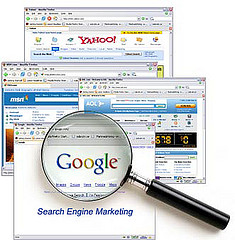 Search Engine Optimization (SEO) and Search Engine Marketing (SEM) are two different types of online marketing. They both boost awareness and online traffic, but they achieve this in different ways. Even though the two phrases, SEO and SEM, seem the same, they are both very different. In this post, I will break down the characteristics of each. Let the showdown begin!
Search Engine Optimization (SEO) and Search Engine Marketing (SEM) are two different types of online marketing. They both boost awareness and online traffic, but they achieve this in different ways. Even though the two phrases, SEO and SEM, seem the same, they are both very different. In this post, I will break down the characteristics of each. Let the showdown begin!
What is SEO?
Search Engine Optimization is a type of search marketing that uses different tactics to help a website rank well within the organic search traffic. SEO uses tactics and strategies to ensure that a website is accessible to search engines and improves chances of a website being found by theses search engines.
The main goal is to rank in a high placement on the search results page of search engines, such as Google, Bing, and Yahoo.
According to Optify, “Websites ranked number one received an average click-through-rate (CTR) of 36.4 percent; number two had a CTR of 12.5 percent; and number three had a CTR of 9.5 percent.”
As you can see, your chances of getting found by people on search engines decreases with every rank number, so it is extremely important where a site sits. It is essential to driving more traffic to your site. The higher the website ranks naturally, the greater chance the site has for more visitors.
When it comes to SEO, it is best practice to use “white hat” tactics, which means you are very ethical about the way you promote your company online. Some of the best practices include; creating great content, using relevant keywords, link building for a purpose, using social media effectively, and improving site’s navigation for a great user experience.
What is SEM?
SEM is a broader term than SEO because it is used to encompass many different options to use search engines, such as paid advertising (PPC). SEM includes acts associated with researching, submitting, and positioning a website within the search engines, strategically. It includes things like search engine optimization, PPC and other search-engine related services that will increase traffic. PPC is what SEM is most known for.
According to MosierData, “On average the top three paid ad spots get 41% of clicks.” This is a little bit larger than the organic results.
Ads in a successful PPC campaign will be shown to those consumers looking for their specific product or service. This usually results in a high conversion rate.
Is one better than the other?
Honestly, I believe that there is not a superior search promotion tactic. It really depends on the products and services you are offering, as well as what you are trying to accomplish with your site. SEO is best used when consistent results are desired. SEO may take longer than SEM, but in the long run your results will most likely help you gain sustained traffic. If you want people to recognize your website as a legitimate source for information, authoritative, SEO is best. Lastly, if you are trying to sell your website, but you want to increase the value search engine optimization is also great.
When it comes to SEM, there are different instances where you would want to use this. If you are in a bind and need results immediately, PPC will deliver faster results. PPC will work amazingly for product launches, as well as other time-sensitive offers. Also, if your website is not rich with content, PPC will be more beneficial than SEO. To achieve greatness with SEO, you need to have a lot of good content on your site. Lastly, if high authoritative sites, such as Wikipedia, news sites, and many others that are similar, are dominating the rankings for a specific keyword, it can be very hard to rank well or even at all. This is another instance where PPC would be very beneficial.
There are many other scenarios where one might be better than the other. If you have questions about SEO or SEM, check out some of our search engine optimization services, or call us at 303-945-4341 today!

